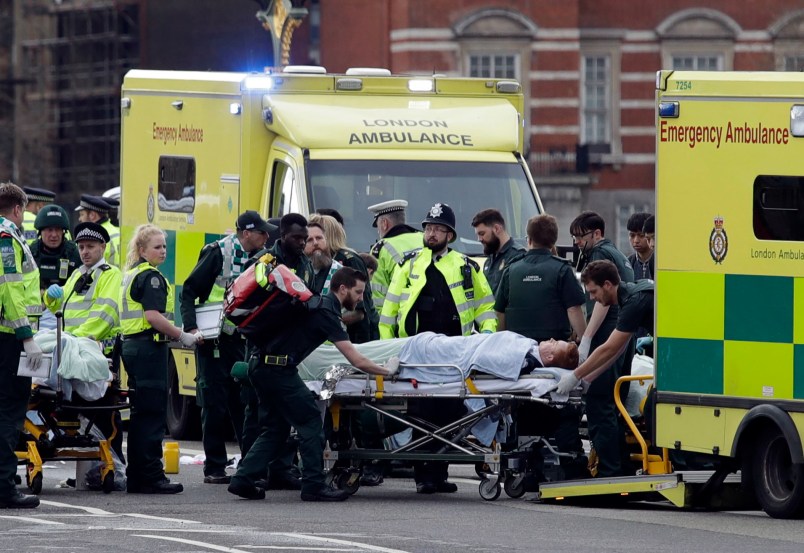LONDON (AP) — Police have found no evidence that the man who killed four people in London last week was associated with the Islamic State group or al-Qaida, a senior British counterterrorism officer said Monday.
Deputy Assistant Commissioner Neil Basu of the Metropolitan Police said Westminster attacker Khalid Masood clearly had “an interest in jihad,” but police have no indication he discussed his attack plans with others.
Basu, who also serves as Britain’s senior national coordinator for counterterrorism policing, said Wednesday’s attack — in which Masood ran down pedestrians on London’s Westminster Bridge before fatally stabbing a policeman guarding Parliament — “appears to be based on low-sophistication, low-tech, low-cost techniques copied from other attacks.”
Masood was shot dead by police after his deadly rampage, which police have revealed lasted just 82 seconds.
Police believe Masood — a 52-year-old Briton with convictions for violence who had spent several years in Saudi Arabia — acted alone, but are trying to determine whether others helped inspire or direct his actions.
Detectives on Monday continued to question a 30-year-old man arrested Sunday and a 58-year-old man arrested shortly after Wednesday’s attack. Both were detained in the central England city of Birmingham, where Masood had recently lived.
Prime Minister Theresa May said last week that Masood was “a peripheral figure” in an investigation into violent extremism some years ago. But Basu said he was not a “subject of interest” for counterterrorism police or the intelligence services before last week’s attack.
Masood was born Adrian Elms, but changed his name in 2005, suggesting a conversion to Islam.
Basu said there was no sign Masood was radicalized during one of his stints in prison, the last of which was in 2003.
“I know when, where and how Masood committed his atrocities, but now I need to know why,” Basu said. “Most importantly, so do the victims and families.”
As Basu appealed for anyone who spoke to Masood on the day of the attack to come forward, the British government repeated calls for tech companies to give police and intelligence services access to encrypted messages exchanged by terrorism suspects.
Masood used the messaging service WhatsApp just before he began his attack. Home Secretary Amber Rudd said Sunday that such services must not “provide a secret place for terrorists to communicate with each other.”
Tech companies have strongly resisted previous calls to create back-doors into encrypted messaging, arguing that to do so would compromise the secure communications underpinning everything from shopping to tax returns to online banking.
Rudd is due to hold a previously scheduled meeting with internet companies on Thursday.
Prime Minister Theresa May’s spokesman, James Slack, said tech firms “should be helping us more” to prevent terrorism.
“The ball is now in their court,” he said.
Slack said that if agreement was not reached with the companies, the government “rules nothing out,” including legislation.
Meanwhile, the families of the dead and injured set about the difficult task of going on with their lives.
The family of an American victim expressed gratitude Monday for the kindness of strangers as they insisted some good would come from the tragedy. A dozen members of Kurt W. Cochran’s family gathered to face the media, sharing their shock and sense of loss.
Cochran, from Utah, was on the last day of a European trip celebrating his 25th wedding anniversary when he was killed on Westminster Bridge. Cochran’s wife, Melissa, suffered a broken leg and rib and a cut head, but is steadily improving.
The family offered profuse thanks to first responders, British and American authorities and people who had sent notes, prayer and donations.
“Last night we were speaking as a family about all this, and it was unanimous that none of us harbor any ill will or harsh feelings towards this,” Sarah McFarland, Melissa Cochran’s sister, said. “So we love our brother. We love what he brought to the world, and we feel like that this situation is going to bring many good things to the world.”
___
Jonathan Shenfield contributed to this story.
Copyright 2017 The Associated Press. All rights reserved. This material may not be published, broadcast, rewritten or redistributed.






